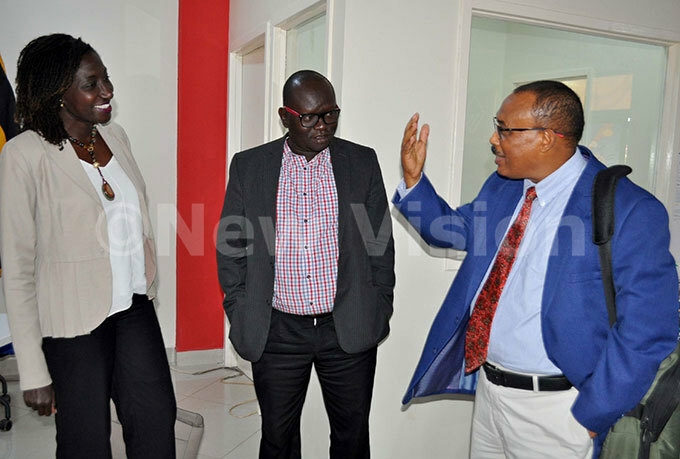Experts call for collective responsibility in malaria fight
Malaria is one of the leading causes of morbidity and mortality in Uganda especially in children under five years.
HEALTH
KAMPALA-As the world prepares to celebrate world malaria day next week, experts have called for collective responsibility in Uganda if the top children killer is to be eradicated.
Speaking at a press conference organised by the US embassy at the American Centre off Ggaba road, the experts from the US presidential malaria initiative and the ministry of health's malaria control program, said without the commitment of the people the interventions being implemented won't achieve much.
Dr. Belay Kassahun, from the Presidential Malaria Initiative (PMI) noted that an intervention cannot have a lasting impact on the fight against malaria without people's involvement.
 The Resident Advisor Centre for Disease Control and Prevention (CDC) US President's Malaria Initiative Dr Mame Niang (Left), the Program Manager Malaria Control, Ministry of Health Dr. Jimmy Opigo (Centre) and the US President's Malaria Initiative Advisor Dr Kassahun Belay (Right) interacting during a press briefing on Thursday. (Photo by Shamim Saad).
The Resident Advisor Centre for Disease Control and Prevention (CDC) US President's Malaria Initiative Dr Mame Niang (Left), the Program Manager Malaria Control, Ministry of Health Dr. Jimmy Opigo (Centre) and the US President's Malaria Initiative Advisor Dr Kassahun Belay (Right) interacting during a press briefing on Thursday. (Photo by Shamim Saad).
He called on Ugandans to start using nets correctly and for those whose houses were sprayed through the Indoor Residual Spray project, should not cover their walls with paper or other paint in order to not tamper with the spray's efficacy.
In 2016, government with the support from PMI started Indoor Residual Spraying (IRS) in 15 selected districts considered high epidemic, aiming to reduce malaria by 85%.
Speaking on Wednesday, Dr. Mame Niang, also from PMI, said in Tororo, one of the pilot districts, Malaria has reduced from 60% in 2013 to 5% in 2018. But she is quick to note that IRS is not sustainable because it's an expensive venture yet they have limited funding.
To spray one house, she said will require $16 (about sh59, 800) which they cannot afford.
"War against malaria is a complex one. You have to fight the vector, the parasite and also tackle the environment that gives a breeding ground to the mosquitoes," she said.
Dr. Jimmy Opigo, the programme manager of the Malaria Control programme at the ministry of health, noted that though IRS puts pressure on mosquitoes, not all die since some fly away and then re-attacks later.
"Our focus this year is to make people learn to keep themselves from the malaria parasites. We need to empower people to adapt some practices and behaviours that do not allow malaria to proliferate in their body," he said.
He advised Ugandans to practice good building practices whereby residential houses have anti-mosquito screens.
Kassahun also asked pregnant women to always attend antenatal care and ensure that they get sulfadoxine/pyrimethamine to prevent them from getting infected and also protect their unborn babies from the disease.
Malaria is one of the leading causes of morbidity and mortality in Uganda especially in children under five years.
Malaria accounts for 30% to 50% of outpatient v visits and 15% to 20% of hospital admissions. Pregnant women and children under five years are the most affected. 37 out of every 1000 children under five die from Malaria.
"To fight malaria, we also look at case management. When one presents with fever symptoms, they should first do a blood test to confirm that it is malaria and then take the appropriate treatment for it. People should not take medicine before being tested," Kassahun said.
Opigo noted that despite the challenges they have in the fight against Malaria, the ministry has made progress in the fight against the disease and they are in the process of rolling out the Malaria Action Programme for Districts (MAPD).
Other projects being implemented include vector link project and five regional health integration to enhance services projects; in Acholi, Lango, East, East-Central and South West.
He said they are also going to distribute 26 million mosquito nets next year but noted that people's input is needed especially in the correct use of these nets.
The trio said there is a funding gap of $1.2bn though they have been able to mobilise $500m.
It is estimated that Uganda losses $200m every year to malaria. Over the years, several interventions have been instituted to fight the disease. These range from behavioural change communication, distribution of insecticide treated mosquito nets, IRS and larviciding.
On April 5, 2018 President Museveni together with legislators, local government leaders and implementing partners made a commitment to fight malaria and launched the Mass Action Against Malaria (MAAM) strategy. On the same day, the Uganda Parliamentary Forum on Malaria (UPFM) was launched.
Recently, the president also launched an anti-mosquito paint manufactured by Plascon Kansai, a Japanese coating company. It is estimated that the paint kills mosquitoes within 24 hours of contact.
The US government has since 2006 been supporting Uganda's efforts to prevent and control malaria.
Through PMI, they distribute insecticide treated nets, IRS, distribution of sulfadoxine to pregnant women, social and behaviour change communication, research and supporting correct diagnosis and effective treatment.
Niang said PMI has helped reduce child mortality by 53% and lowered prevalence among children from 42% to 19%. PMI has also given more than four million Ugandans protection every year.